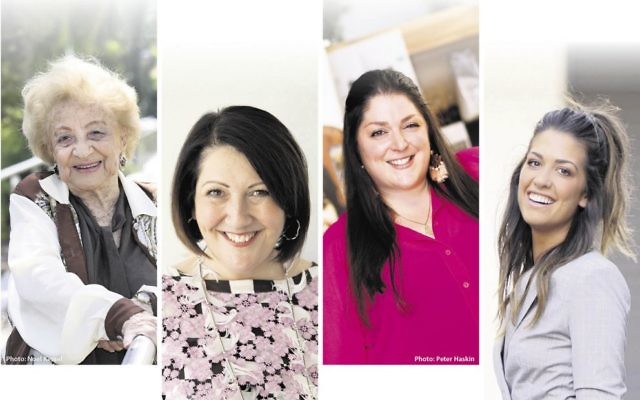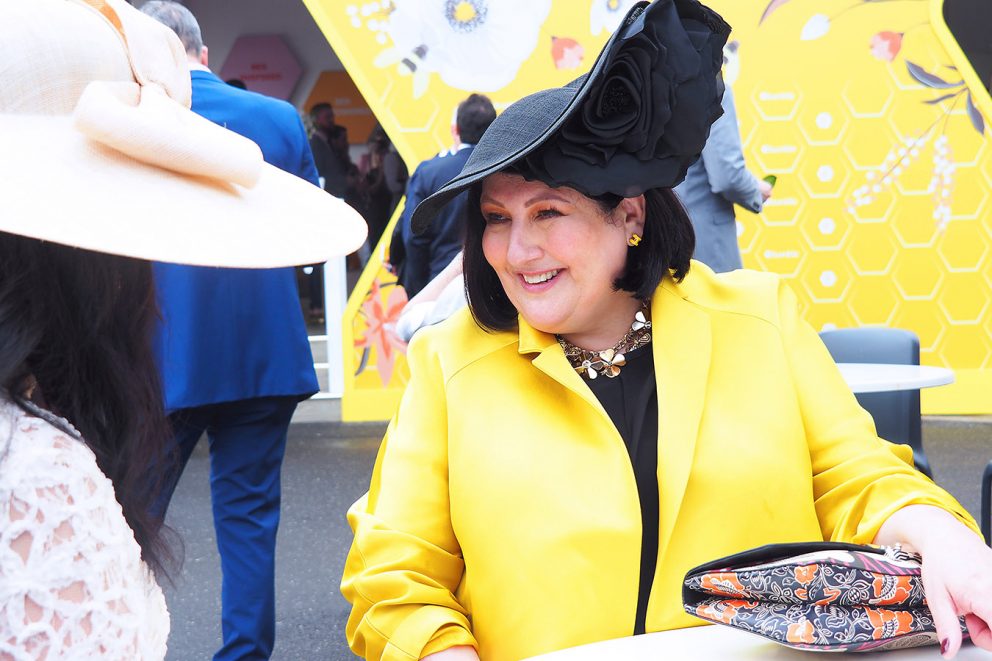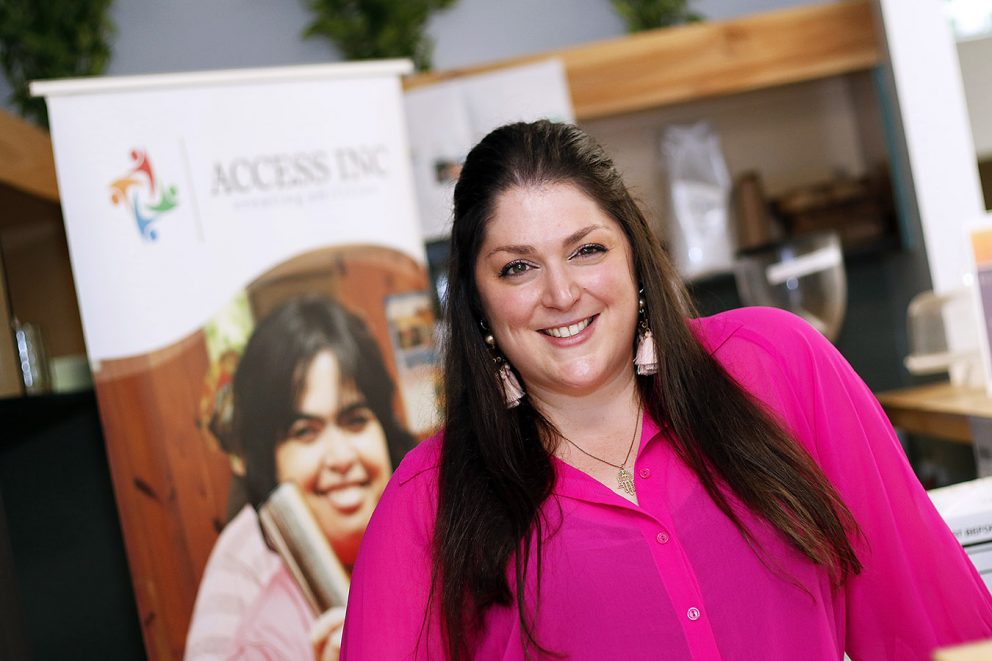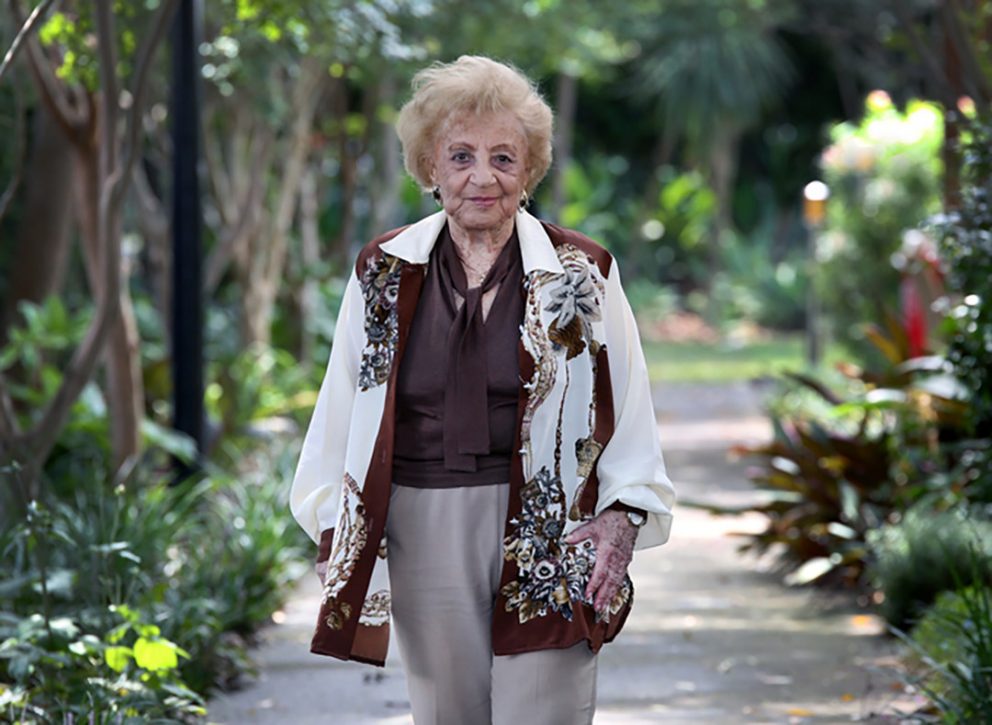Women who wow
Today is International Women's Day. Rebecca Davis and Sophie Deutsch celebrate a few remarkable women of the community.
Today is International Women’s Day. Rebecca Davis and Sophie Deutsch celebrate a few remarkable women of the community.
WE are working women. We are stay-at-home mums.
We are lawyers, doctors and teachers; artists, authors and actors.
We are councillors and cooks; lawyers and librarians.
We are graphic designers and fashion designers. We are students, scholars and managers, members of parliament and the media.
We are contributors to every aspect of life – public and private.
We are resilient.
Survivors of the Holocaust; survivors of ill health; survivors of domestic violence and sexual assault.
Mothers, daughters, sisters, aunts, friends and girlfriends.
Nurturers and life givers who try to eat well, cook well and make that gym class.
We wear many hats, do many things, and strive for balance.
On International Women’s Day, we globally celebrate the social, economic, cultural and political achievements of women.
There are an immeasurable number of remarkable women in our community; too many for two pages, an entire edition, or indeed 52 editions.
But we highlight just a few, and celebrate their stories, as collectively we celebrate all women.
JUDI HAUSMANN | PR powerhouse
JUDI Hausmann is a giant in the world of public relations (PR). The founder and chief executive officer of The Haus (formerly the Hausmann Group), an independent PR and marketing communications group, Judi was pivotal in the establishment of the consumer PR sector in Australia. She is also the founder of HSPR, the first and only PR industry-initiated registered training organisation to provide nationally recognised PR qualifications and vocational training.
Judi’s PR journey began at the age of 20, a long way from her hometown Sydney – in Jerusalem – where her family were taking sabbatical.
“I became the door lady at the Hilton Hotel in Jerusalem, which was actually part of the public relations department. That was the first time I had even heard of the words, public relations!” tells Judi from the famed birdcage at the Melbourne Cup last year – an overt representation of her trajectory.
The Haus was responsible for the popular and exclusive Bumble and Mumm Champagne marquees.
But in Jerusalem, Judi dealt with a very different clientele, recalling the many Knesset members who she came to know in the role.
“Everyone kept asking me if I was going to work in PR, and in the end, I figured out that it was probably a good thing for me, because so many people kept saying it.”
After Israel, Judi journeyed to England were she worked in advertising before returning to Australia in the mid-1980s.
“PR in Australia was really in its infancy. It was very behind – a whole lot of journalist men who liked to drink at lunchtime, and then typed on their typewriters in the afternoon, while having a few longnecks.
“That was not what I was trained to do, so in the end I ended up setting up my own business.”
In 1990 the Hausmann Group was born, with some of Judi’s first clients including Coca Cola, 16 alcohol brands – from Moet to Kahlua, and Tip Top Bakeries.
Six weeks after launching, Judi already had 10 staff, “so my next few years was just trying to keep it down, and actually work out how to run a business”.
After 29 years, her team has grown to 50. “I’m a Jewish mother! I love them like my kids.”
“I care about their lives and I always tell them I’m available,” – even for relationship advice or restaurant suggestions.
Judi’s love of people and mentoring is what led her to the establishment HSPR in 2013, “because I am passionate about educating the next generation”.
Married to “the boy next door” for the last 31 years, and a mother of one, Judi is also a foundation director of the Sydney Theatre Company. She also founded Judi’s Shelter,
a refuge for women and children in war-torn Kabul, Afghanistan, in conjunction with NGO Mahboba’s Promise.
So what is her key to success?
“Just be nice. It can go a long way if you are a good person,” says Judi.
“And believe in yourself, as well. I think that is something that a lot of young women struggle with; think they are faking it. We’re all making it up every day. If you just keep your basic personal values straight and use your brain, you’ll be fine.”
SHARON MALECKI | communal leader
IN her mid-20s, Sharon Malecki was set to make aliyah. Armed with a Masters in diplomacy and trade, and a first class honours degree in international relations, she had a ticket booked to Israel and had said her goodbyes.
“Do you really want to start a new life in a bunker?” Sharon’s mother asked.
At that time her mother was based in Haifa, caring for her parents. Conflict was raging and katyusha rockets were landing on her street.
“I just don’t know if emotionally I can handle worrying about you being here,” she told Sharon.
“It was the only time in my life that I can recall my mother asking me not to do something of significance – and I decided to respect that. But then it became a case of where to now? Melbourne or Sydney?”
Two weeks later, Sharon left her home on the Gold Coast and arrived in Melbourne. A short time after her move, she visited Beth Weizmann.
Jewish communal work was not unfamiliar to Sharon. While in Israel in previous years, she had volunteered aboard Magen David Adom (MDA) ambulances, and tutored immigrant children at an absorption centre. But, her communal involvement goes back even further.
“Literally some of my earliest memories are of being at a UIA Gala, or a Zionist Council Yom Ha’atzmaut event,” she recalls.
Sharon’s father had been the head of many Jewish or Israel-oriented community organisations on the Gold Coast, and her mother was also very heavily involved.
“It played a big part in my life, and then when I moved to Melbourne I realised that I could make a career on top of that.”
Sharon began as a volunteer for MDA, and after some time could see a gap in youth engagement. She pitched for a paid position, essentially creating a role as project officer for herself, while also becoming the president of Young MDA.
From there she went to Jewish Care Victoria, where she managed their volunteer resource program. When Sharon started, there were a couple of hundred volunteers. By the time she left four years later, Sharon had more than 500 volunteers with 80 on the waiting list.
Since 2017, Sharon has been the chief executive officer of Access Inc, the not-for-profit organisation which promotes the rights and interests of people with disabilities within the Jewish community.
To hold the role of CEO in her 30s is no easy feat – and her path has not been without challenges. Sharon remembers when she encountered sexism, ageism and antisemitism in another workplace. Her mentors were integral, “to act as mirrors” during the hardship, reminding her that this was not acceptable.
“I think it is because of them, as well as my own personality that I was able to walk away with at least some sense of self, and my integrity was intact.”
Indeed, Sharon’s strength of conviction has been fundamental in her success, as has been recognising opportunities when they present.
“I think I’m also super driven to create opportunities when they might not be there, and most importantly, saying yes to them, even the ones that my first instinct might not be.”
But the elusive quest for balance is a work-in-progress.
“As I’ve gotten older, I have to take active and regular steps to take care of my mental, physical and social health,” she says.
“Because at the end of the day, I just want to create as much positive impact as possible. I want that to be my contribution and legacy and the community that I live in.”
HELENA GOLDSTEIN | survivor
HELENA Goldstein has always found humour in her darkest hours. The now 100-year-old Holocaust survivor, who celebrated her birthday last month, began writing a satirical newsletter while crammed into a bunker with eight other Jews, in the hope that providing a light-hearted spin on an unbearable situation would raise the spirits of her fellow companions.
“The bunker was about the size of this kitchen here, and maybe a little bit wider,” comments Helena, pointing over to her quaint kitchen, “but it was all in soil”.
“[Some of the Jews in hiding] said they were going to leave because they couldn’t live like that.”
Fortunately, Helena’s ingenious idea to boost morale through the healing power of humour achieved a miraculous result.
“It helped me and it saved the lives of nine people,” she says.
Even now, as Lena sits in her warm apartment revisiting memories of the Holocaust, she intersperses despairing recollections with comic relief.
Glancing over The Bunker Weekly – the name of the satirical newspaper she penned – which sits on the table before her, Lena reads out the weekly “meal planner” for the group. Monday consisted of “one bowl of spit soup, two patties with coffee,” all other days were the same, but Sunday had a special addition of dumplings with one bowl of spit soup.
“You see, you are laughing,” she says joyfully. “When you laugh the anger is gone.”
Preceding the six months spent in an underground bunker before Poland was liberated, Lena spent two years hiding in a small bathroom, prior to which she lived in the Warsaw Ghetto.
Managing to escape the persecution that claimed many of her loved ones, including her parents, brothers, grandparents, friends and boyfriend, the diary Lena scrawled in, while crammed inside a tiny bathroom, reveals her deep-seated pain, wistful yearning for a bygone era and the bitter struggle of daily life. They are sentiments her newsletter masks entirely.
“I long for the splatter of autumn rain, I long for the monotonous music of raindrops beating with fine drizzle against a window pane… And I long for the thoughts: thoughts at a twilight hour, the thoughts which, sad as they might be, never begin with the words ‘If I survive…’, and never carry the burden of doubt that all this thinking is empty and pointless, because … I will not survive anyway,” she wrote.
Her eloquent diary informed the name of author Barbara Miller’s recently released book, If I Survive, which was launched last month, and tells of Lena’s inspiring story.
With her brother’s words serving as a source of strength, Lena made it her mission to survive.
“He said to me: ‘We each have to try in a different way to somehow survive because somebody has to be the eyewitness.’ And from then on, I promised him that I would try to survive.”
After liberation, Lena married Alexander Goldstein, and they immigrated to Australia in 1949. Reflecting on their arrival in a new land of opportunity, Lena vividly recalls her first taste of freedom.
On Sundays, Sydney’s Domain was used as a speakers’ corner for members of the public to voice complaints about the government, the police or any issue of their choosing.
“Everyone was complaining about something – except the Queen,” recalls Lena.
“Then we looked around and we saw a policeman just walking, smiling and talking to people. We were not used to this. The police [we knew] were very dangerous, and here they were best friends and they didn’t arrest anybody.”
“I said to [Alexander], you see, that’s freedom, because we didn’t know the meaning of the word ‘freedom’. In that moment, I fell in love with Australia and the love affair lasts until today.”
As an eyewitnesses to the Holocaust, Lena, the proud mother of two sons and six grandsons, says she feels she “has a debt to her family, and to all remnants of the Jewish nation” to tell of the bitter atrocities she endured.
Talking rarely comes easy though. “Every time I talk, I forget simple words as there are too many emotions,” she remarks.
Through her dedicated work as a volunteer with Courage to Care and the Sydney Jewish Museum, Lena’s bravery in sharing her story of struggle and survival continues to have an enduring, often life-changing, impact on students’ understanding of the Holocaust, and the dangerous effects that bullying, discrimination and bigotry can brew.
“Once there were three Muslim girls who came up to me [after a lecture], and they started kissing me and thanking me, and said they found out about something they didn’t know about because nobody told them what happened in the Holocaust,” Lena recalls.
“I could see they had been changed by lecture.”
And at 100 years of age, Lena doesn’t plan on stepping down any time soon.
“I still feel that, as long as I can talk, and if people want to listen, I will tell my story.”
If I Survive can be purchased at barbara-miller-books.com/if-i-survive
LAUREN SILVERS | entrepreneur
Lauren Silvers is a Bondi girl who had a big idea. In 2013, she was working as a beauty and fashion publicist when she realised the difficulty of balancing a busy professional schedule while maintaining the polished appearance required by her industry.
It was a time when peer-to-peer services were rising to popularity, with Uber, Airbnb and Deliveroo beginning to take off. Lauren then had the “aha” moment that resulted in Glamazon.
Launched in 2015, Glamazon is an app that matches women with surrounding freelance beauty services, allowing them to be treated in the comfort of their own home.
“I didn’t even know what the words start-up meant when I was starting a start-up. I just had an idea!” reflects Lauren.
The following year, Lauren connected with Lisa Maree, a fellow entrepreneur who was working on a similar concept. They realised that if they collaborated together, they could be more successful. They did, and they were. As soon as they merged, their revenue grew by 75 per cent, month on month.
In July 2017, Lauren and Lisa appeared on our TV screens on Channel Ten’s Shark Tank, the program where budding businesses pitch their entrepreneurial ideas to four business experts, “sharks”, hoping they will invest. The girls were grilled, but the sharks were impressed, resulting in an investment offer of $250,000 by tech entrepreneur Steve Baxter.
Following the airing of the program, Glamazon exploded and they “10xed their business in a week,” Lauren tells.
The platform attracted further interest resulting in more capital being secured, and global opportunities.
“The success is a testament to our families, and the way we have been brought up,” says Lauren.
Lauren’s paternal grandfather, Daniel Silvers, arrived in Australia from Germany after the war “with absolutely nothing”.
He eventually began working in the fire extinguisher business. After some time, he realised that he could make improvements to the industry, and went out on his own to establish Fire Guard.
“He was so persistent,” tells Lauren, “He eventually became one of the largest players in the market.”
Now 94 years old, his business lessons are still as relevant today, notes Lauren.
“He always says, never talk badly about your competitor, not even to me. Appreciate what they do, watch what they do if you want, but focus on what you’re doing. Don’t worry about them.”
Lauren reflects on his advice as the “pockets of gold that have helped me get through”.
And now Lauren has some advice of her own.
“Whatever it is that you feel super passionate about, go for it. You will only regret what you don’t do.”






comments